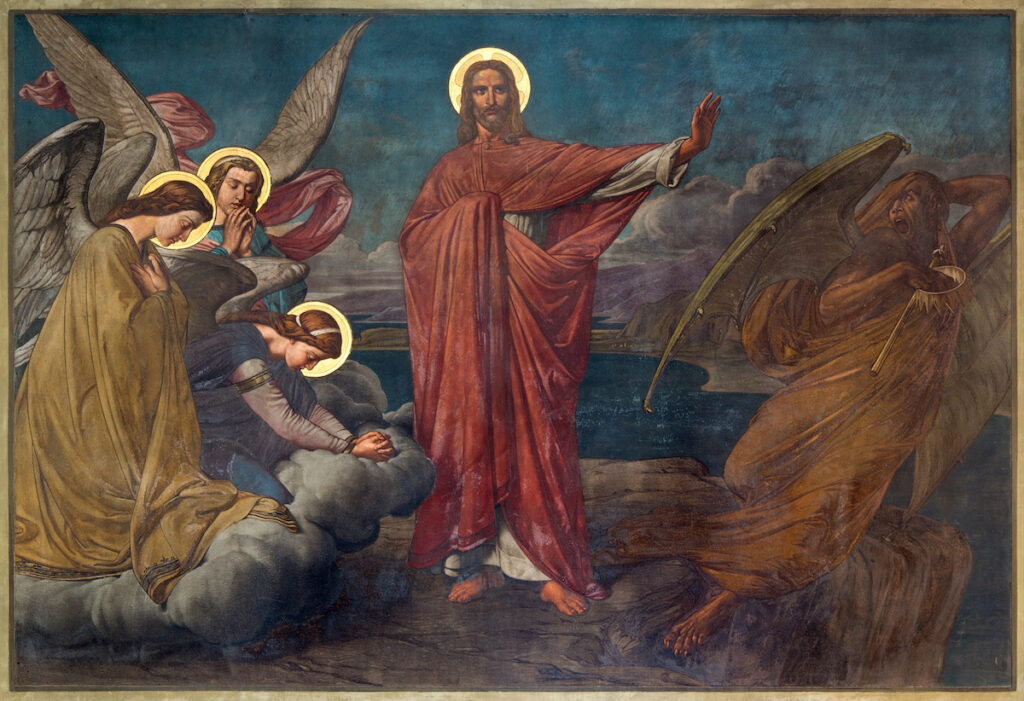One of the games our granddaughter delights in playing is hide-and-seek. She loves being the one who’s hiding, and when she’s found, squeals of delight erupt, suggesting that no matter how well she tries to hide, the fun really begins when she’s found as we wrap our (pre-COVID) arms around her.
There are times when it seems as if God also likes playing hide-and-seek, and nothing delights him more than when people who are searching to find themselves discover they can only do so when they find God. The reason is that God never stops seeking us.
At no time in the liturgical cycle is this more apparent than during the post-resurrection stories. No sooner does Jesus appear than it seems he disappears, but not before offering some rather cryptic words.
His cautionary warning to Mary Magdalene when she tried to reach out to him signaled a change. His words — “Do not hold on to me, because I have not yet ascended to the Father. But go to my brothers and say to them, ‘I am ascending to my Father and your Father, to my God and your God’” (Jn 20:17). — were unexpected.
It may seem as if the previous intimacy between Jesus and his closest friends has changed, but nothing could be further from the truth. Before his death and resurrection, Jesus addressed the apostles by calling them friends; now he referred to them as brothers. They were more than friends; they were family.
On the road to Emmaus, Jesus assumed the appearance of just another traveler, that is until he revealed himself in the breaking of the bread, only to disappear again.
Throughout the first chapters of Acts of the Apostles, Jesus’ appearances seem to take those who see him by surprise. He appeared in the upper room to the apostles, who were hiding behind closed doors, revealed himself to some women on their way to the tomb and turned up on the beach where he was fixing breakfast for a few disciples who were returning from a night of fishing.
After the resurrection, there was something very different about Jesus. His comings and goings took on a mystical quality. He was gradually weaning his followers from depending on their senses to seeking and finding him through faith.
Knowing that he would be leaving them soon, Jesus’ appearances reassured his followers that he was alive, but soon they would have to depend on faith to see them through their journey.
When Jesus told Thomas, “Blessed are they who do not see but believe,” he had in mind people throughout the ages who would follow him despite never having seen him in the flesh. He had in mind people like you and me and everyone who believes without having to see.
Jesus’ death and resurrection won for us the privilege of participating in his life through grace, and as St. Paul was told when he asked that his struggle be removed, “My grace is enough for you, for it is in weakness that power reaches perfection” (2 Cor 12:9).
Jesus never promised to take away suffering, but he did assure us that the grace needed to remain faithful was ours for the asking. Grace is not some kind of fairy dust that God sprinkles over us. Grace resides in us and all around us. If we believe that grace is the self-revelation of God, then grace is present in the people and events of our lives, and all who seek God shall find him.
As Guigo, a 12th century Carthusian monk, wrote: “Seek in reading and you will find in meditating, knock in mental prayer and it will be opened to you in contemplation” (CCC: 2642). His advice suggests that all who seek God will find him.
It may well be that God enjoys playing hide-and-seek with us. Yet, knowing how easily our attention strays, Jesus has left plenty of clues and places where we can find him. His presence in Word and Sacrament are primary, but his presence is also revealed in the beauty of nature, a child’s smile, the embrace of a loved one and in the homeless person we encounter.
Just as Mary Magdalene recognized Jesus when he called her by name, so Jesus has called each of us by name and promised: “ask and you shall receive, seek and you will find, knock and it will be opened to you” (Lk 11:9).
If you haven’t found Jesus, it may be that you’ve stopped searching. If that’s the case, there’s no better time to continue where you may have left off. Jesus wants to be found so that he can wrap his arms around you.

